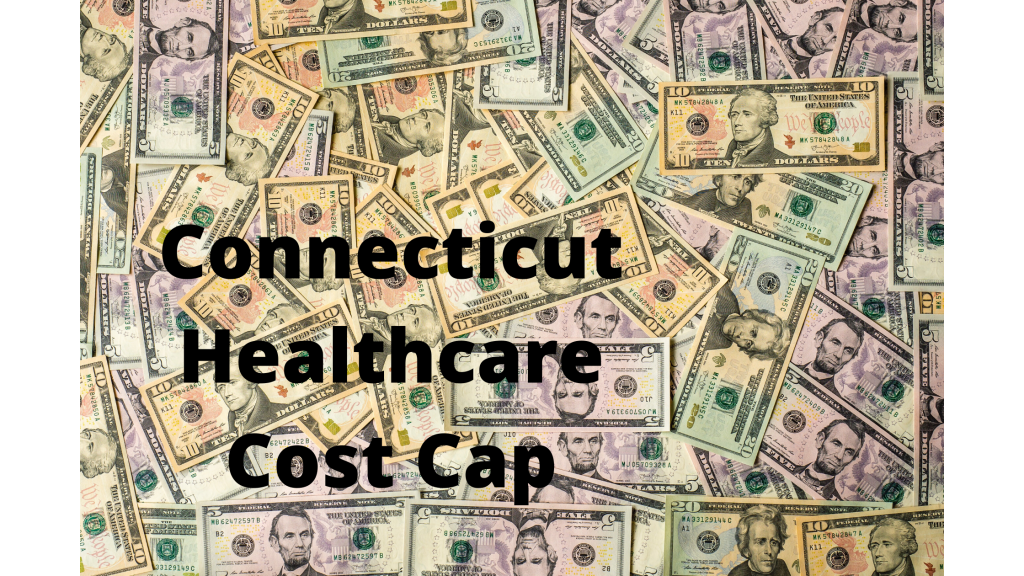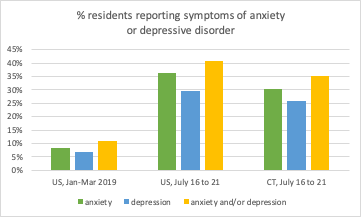providers
COVID hit Medicaid hard
Medicaid members were about 33% more likely to be diagnosed with COVID than other Connecticut residents, according to CHNCT’s presentation Friday to the Medicaid oversight council. The average age of members with COVID was 52 years but ranged from newborn to 102 years old. Like the rest of the population, COVID hit Medicaid members with…
Read MoreCost cap committee excludes patients’ provider choices from primary care spending increase
On Thursday, the main committee convened by the Office of Health Strategy (OHS) met to continue their work to set a cap on how much healthcare costs can increase and, at the same time, double spending on primary care. At the meeting they codified a narrow definition of primary care provider for purposes of calculating…
Read MoreOne in three CT residents is anxious and/or depressed
The good news is that the rate of Connecticut residents reporting symptoms of anxiety or depressive disorder is down some since the end of April, according to a new CDC survey. The bad news is that it’s three times higher than this time last year. The week of April 23rd, when Connecticut was deep into…
Read MoreOHS Cost Cap committee retreats on quality, providers driving the delay
The Office of Health Strategy (OHS) rejected concerns been raised by stakeholders and some Cost Cap committee members that the Cost Cap on healthcare spending will be implemented at least a year before reporting on quality performance. Concerns center on the possibility of lowering costs by lowering the quality of care to achieve the ambitious…
Read MoreCost Cap committee considers who qualifies for increased primary care spending
In response to stakeholder feedback that the prior Cost Cap levels were unrealistic and risk unintended harm to patients, at their last meeting the Office of Health Strategy’s Cost Cap committee slightly softened the cap levels. The committee continued their discussion of which providers qualify as primary care providers. OHS wants to significantly increase the…
Read MoreUpdate: OHS committee slightly eases unrealistic cap for CT healthcare costs
In response to stakeholder concerns, at their July 29th meeting the Office of Health Strategy’s (OHS) Technical Team choosing the cap for future Connecticut healthcare costs eased their previous decision on how much healthcare costs for every state resident will be allowed to increase over the next five years. Many stakeholders have voiced concerns that…
Read MoreComprehensive updated resource on Connecticut’s health landscape from DPH, get involved
Almost one in six Connecticut children are food insecure and the number of state residents newly diagnosed with HIV has been dropping since 2010, according to the Dept. of Public Health’s new 2019 State Health Assessment. In 2017, 14.4% of Connecticut high school students used e-cigarettes, up from 2.4% in 2009. Over one in four…
Read MoreCost cap update – possible easing on growth cap but primary care target proves difficult
In response to concerns from many sources about potential harm to people, the Office of Health Strategy (OHS) is considering easing the proposed caps on the growth of all healthcare spending. In the latest Technical Team meeting, OHS and Bailit, the consultants running the project, said they would consider starting the cap next year higher…
Read MoreOne in three CT residents reported anxiety or depressive symptoms in June
Since the pandemic started, more people are reporting symptoms of mental illness. According to the Kaiser Family Foundation, 19% of Connecticut residents are experiencing mental illness and 36.6% report depressive or anxiety symptoms last month. Connecticut adolescents are twice as likely to report a major depressive episode as adults but adults are three times more…
Read MoreFact Check: Are primary care doctors underpaid?
Download the Fact Check A statement was made in a recent Connecticut state public meeting that primary care physicians are paid less than specialists. The statement was made a recent Technical Team meeting for the Office of Health Strategy’s cost cap project considering a substantial increase in spending on primary care. The facts, however, are…
Read More






